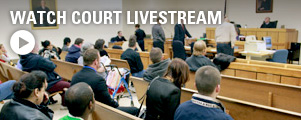Drug Court: A Different Kind Of Second Chance
Michael Sheehan is dressed in a dark suit and tie and at first glance you could easily mistake him for a lawyer. You would never guess that for the last three decades he’s been fighting a battle against addiction to cocaine and alcohol. Five years ago he had gotten clean. But all it took to bring him down was one night in Brockton.
“When I relapsed five years ago, I was a general contractor, huge business, two boats. Brand new trucks. Been sober five years, sponsoring a guy,” Sheehan said.
“I was at a meeting in Brockton with my group, and decided I was going to go to Brockton for one night. Just one night. And it was all gone. A year and a half later, everything was gone. All my business, my tools, my marriage. I left my 12-year old son, waiting to get picked up for guitar lessons. Just didn’t show up.”
Audio clip: Adobe Flash Player (version 9 or above) is required to play this audio clip. Download the latest version here. You also need to have JavaScript enabled in your browser.
Above: Click to listen to a story about Sheehan’s long road from addiction to graduation.
Convicted of larceny in 2010, Sheehan was headed back to prison. But the court offered him an alternative. “Drug court,” a strict rehabilitation program, usually 18 months long, that would require living in a halfway house with a curfew, as well as submitting to regular drug testing and counseling. And appearing weekly before Quincy District Court Judge Diane Moriarty.
“Usually as judges we only see all the bad stuff happening. We never see the good stuff happening,” Judge Moriarty said. “The drug court is different because I see them every week and I see them getting better, and getting healthier, and reconnecting with their family, and getting a job, and feeling better. And not have that urge to do the drugs and then have to commit crimes to support themselves while they’re doing the drugs.”
A native of Somerville and an altar boy growing up, Sheehan got hooked on cocaine as a teen and had his first run in with the law at 21. Now 49, he’s been in and out of prison more times than he can remember. He decided to take a chance on drug court. On this day, he graduates.
“Fifteen months ago when I came to Drug Court I was desperate. I wanted to get sober, and I was wiling to do whatever it took. That’s really what it comes down to.
“But I was definitely scared. I mean, look at my pattern. It would be like a fireman. The bell would go off, and I had to answer it. I’d be right in the middle of a family get-together, there’d be 60 people in the house, everything’s going great, I’m talking to my brother. And my mind’s thinking, you know what? I want to go get high. So I say, ‘I’ll be right back.’ Very convincing, ‘I’ll be right back,’ and I would just go. They wouldn’t see me for a week. I’d be off and running.”
Instant consequences
Drug court demanded of Sheehan the one thing he was the worst at: honesty. Lying and breaking the rules had instant consequences. Getting locked up for a couple of days, or, if he made too many missteps, serving out his full prison sentence.
“If you pick up in Drug Court, you’re doomed. You can’t fake those urines all the time and show up for your appointments when you’re active. Sit there and be honest with somebody in a Probation meeting. These people have been in business for a while, they know what they’re doing, you know?” Sheehan said.
“I really am, I’m grateful it exists. If it didn’t exist, do you know what would have happened to me? I would have done my time and I would have got out and I would have the same problems.”
Sheehan says recovery could not have happened for him in jail.
“In order to get recovery, you’ve got to be living in the environment you’re going to live in. When you’re in jail, there’s a whole nother environment. It’s a different set of rules. How are you supposed to go to somebody and be honest about what you’re feeling? Because all you’re really feeling in jail is fear, anger, mistrust, you don’t trust anybody, you’re a fool if you do.
“How do you bring out that inner child, how to do you find out that person that God wants you to be? How do you get in touch with that God?”
Audio clip: Adobe Flash Player (version 9 or above) is required to play this audio clip. Download the latest version here. You also need to have JavaScript enabled in your browser.
Above: Click to listen to Sheehan talking about how drugs damaged his relationship with his family
Does it work?
The Quincy drug court program is one of 16 state drug courts currently operating in Massachusetts.
In the past 10 years, 450 people have started the Quincy program, and more than a third have graduated. Even those who don’t make it all the way through, learn skills to stay clean.
Most go through the twelve steps of Alcoholics Anonymous and begin to take a hard look at their lives.
A recent study of drug courts funded by the U.S. Department of Justice found that they significantly reduce both crime and drug use.
The study also found that while drug courts require an investment of money, the reduction in crime saves money and keeps the streets safer.
Judge Moriarty came to believe in drug court through her work as a defense attorney.
“When I was a defense attorney, I found that 85% of my clients were involved at some level with drugs or alcohol when they committed the crime or were drug seeking, and that’s what most of the kind of crime was that I saw, so I said there’s got to be something else that we can do besides this roller coaster,” she said.
Sheehan believes he is now off the roller coaster. He shares custody of his two children with his ex-wife and is starting a new construction business. He says the urge to use never completely disappears, but this time, he’s ready for it.
“I have a defense against using tonight,” he said. “It’s just because I did the right thing this morning and I did the right thing yesterday, and I’ve got a plan of action.”
Everyone who completes the drug court reads a letter on graduation day. In his, Sheehan said, “I have a disease of addiction but today I don’t suffer from it. Thank you to Judge Moriarty and Judge Coven for giving me the 20th something chance.”
Sheehan also thanks his halfway house and his sponsor for helping him in his daily struggle to transform lifelong beliefs and behaviors. If you don’t feel this sense of gratitude, he tells his fellow members, then change what you’re doing. Because a grateful heart doesn’t drink.
Above: Watch Sheehan’s drug court graduation. His graduation letter begins at 3:42.













I was stunned and relieved to hear this incredible offering Monday. My daughter is struggling in similar ways and I am struggling about how to help and neither enable nor overtake and manage her recovery process.
Thank you for this incredible presntation of true life.